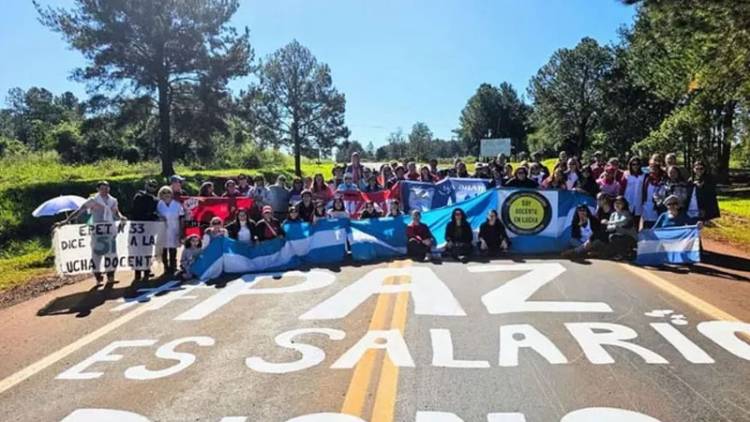
“The pots in front of the schools, the marches, the camps, the roadblocks; “They bother the government,” says a leader of Ftel (a front of unions in struggle) in the Posadas assembly at the end of the negotiation. There they resolve to continue deepening the path of struggle these days because they know that they have strength, that the people of Misiones rose up, won the streets and put in crisis the Passalacqua government’s plan of a province with miserable salaries for workers and huge profits for capitalists. .
In Eldorado, at the end of the negotiation, Ruben Ortiz, general secretary of the MPL, reported in the meeting with the government the first points of discussion at the table and that the government committed to comply with, were the cessation of causes, threats and intimidation of the education workers and the return of every day discount due to forceful measures.
The government’s offer was a 9% increase in the basic salary, that is, an increase from $100,000 to $109,000 for a teacher who is just starting out, which would go from $250,000 to $438,000 and a more senior teacher would reach $544,757. Breaking down the increase, the leader clarifies that it is actually 9% and that it is insufficient. This offer was rejected by all the unions that make up the FTEL and it was agreed to go to an intermediate room until Tuesday in Eldorado.
The offer is incredible when the senators of Misiones, days before the vote on the Bases Law, who entered as senators on the list attached to Sergio Massa and today raise their hands for Milei, increased their diet by 8 million pesos to continue legislating against working families, when a teacher who was just starting out earned 280 thousand pesos until a few weeks ago. Their names are Carlos Omar Arce, Enrique Martín and Goerling Lara from the Frente Renovador para la Concordia and the PRO.
For Tuesday, a world is missing and the teaching forces are being reorganized.
In the assembly, the teachers, with more anger than before the meeting, decided to continue on strike Monday and Tuesday, with cuts, camps and marches. “We believe that this adjustment proposal coming from the provincial and national government can be defeated,” Cerro Ortiz.
Unity and coordination to win
Assemblies were held in Posadas, Oberá, Iguazú and several cities to evaluate the government’s offer. The fight continues. Having forced the government to sit down to discuss salaries with the FTEL is an important step in this fight. In addition, they forced the province’s finance minister to connect to the meeting. There were different threats to tire out the teachers with the date, time and place of the meeting. The government does not want the chalk workers to score a victory after a fight that will go down in the history of the province. The powerful think that if the teachers win they can lift up the educational communities of other provinces, which can infect the precarious, the Yerba, wood or tobacco workers. In many places it is already said “let’s do as in Misiones”.
The fight in Misiones continues. Today, Government meeting with leaders of sectors in conflict without agreement; Negotiations will continue Monday and Tuesday. La Izquierda Diario covers the conflict and spoke with representatives in camps in Posadas and in the interior of the province. pic.twitter.com/yZAfQKgNmI
— La Izquierda Diario (@izquierdadiario) June 1, 2024
“What also bothers them is that we are together, that the retirees, the doormen, the assistants are there, that we are in solidarity with the health workers. So that is the path, unity and fight.” Applauded by hundreds of teachers in the assembly, a Ftel leader proposed to continue seeking the unity of the province’s workers, starting with the health workers who are in struggle. This unity, which has strength and the potential to lift up the producing class and strike with a single fist, is the force that the government has been trying to break since the conflict began. After the government settled their salaries with the senior police officers, it hoped that with threats and causes to teaching, with promises of salary increases for health, it would end up breaking the will to resist of the sectors in struggle. Very far from this.
More testimonies from references in the camps that are being held in Posadas and throughout the interior of the province of Misiones pic.twitter.com/7OOMtIKeIT
— La Izquierda Diario (@izquierdadiario) June 1, 2024
These days are decisive to defeat in Misiones a model that the dominant parties want to nationalize. The national adjustment to the provinces as a result of MIlei’s chainsaw puts provincial governments between a rock and a hard place. They do not want to affect the profits of businessmen in their provinces and unload the crisis on the backs of the workers.
Unfortunately, the provincial unions do not call for a measure by the working class of the province as a whole, such as a provincial strike until the adjustment policy of Passalacqua and Rovira is defeated. With this lack of a provincial fight plan, they support the government’s strategy of negotiating by dividing the fighting fronts and forcing teachers and health to fight alone. It is urgent to impose a provincial measure from the bases that forces even the national unions to support the province with national measures, break the isolation and fight until all the demands of the missionary working people are conquered. At the national level, CTERA and UDA have to promote a solidarity campaign and a national strike to not leave missionary teaching isolated.
That is why we have to redouble our support for the teaching and health workers of Misiones, spread their struggle and contribute to their fighting fund so that they do not go bankrupt with hunger.
Source: www.laizquierdadiario.com

